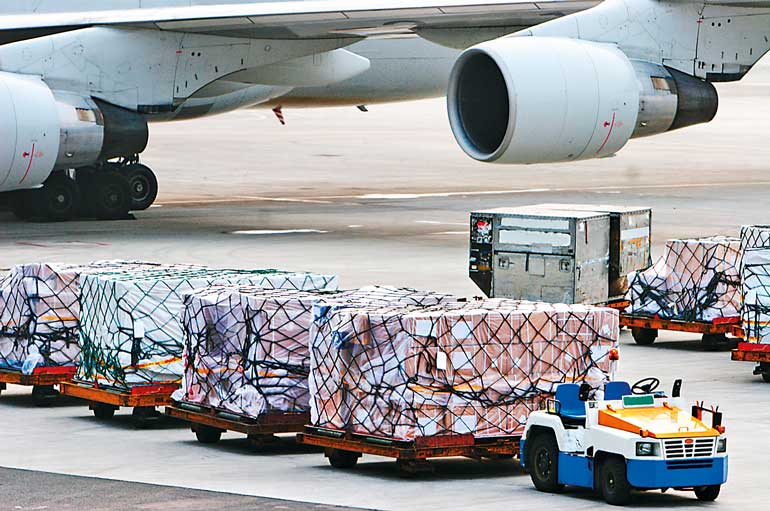Thursday Feb 19, 2026
Thursday Feb 19, 2026
Monday, 15 August 2016 00:00 - - {{hitsCtrl.values.hits}}

IATA’s data for global air freight demand in June 2016 shows a rise in freight ton kilometres (FTK) of 4.3% year-on-year.
This was the fastest pace of growth in 14 months. Freight capacity measured in available freight ton kilometres (AFTKs) increased by 4.9% year-on-year, keeping yields under downward pressure.
Freight demand increased year-on-year in June across all regions with the exception of Latin America which recorded a 9.8% decrease, compared to the same period last year.
The Middle East and Europe posted the fastest demand growth in June with year-on-year increases of 8.0% and 5.1% respectively.
“June saw an improvement in demand for air freight. That’s good news. However, we cannot read too much into one month’s performance,” said IATA Director General and CEO Tony Tyler. “Air cargo markets have been in the doldrums for several years during which there were several false starts on indications for improvement. We will continue watching developments closely, keeping in mind that the air freight business environment is fragile. Global economic growth remains sluggish, world trade volumes continue to trend downwards and the industry faces heightened uncertainty in the aftermath of the Brexit vote.”
Regional air freight performance
Asia Pacific airlines reported a 3.5% increase in demand for air cargo in June compared to last year. Capacity expanded 3.6%. The Asia Pacific air freight market has been improving in recent months, most notably the large ‘within Asia’ market. Nonetheless freight volumes from ‘emerging Asia’ continue to face headwinds from weak trade in the region and globally.
North American carriers saw freight volumes expand 4.3% in June 2016 compared to the same period last year. Capacity increased 4.0%. International freight volumes continue to suffer from the strength of the US dollar which has kept the US export market under pressure.
European airlines witnessed a 5.1% increase in freight volumes and a 4.9% increase in capacity in June 2016. The positive European performance corresponds with signs of an increase in export orders in Germany over the last few months. Seasonally adjusted freight results for Europe are now trending upwards.
Middle Eastern carriers posted the largest increase in freight volumes of all regions for the 16th consecutive month in June - 8.0% year on year. Capacity increased by 8.7%. Although the leader in market growth, the Middle East’s international freight growth rate (6.5%) for the first six months of 2016 is less than half the 14.3% average growth for the same period in 2015.
Latin American airlines reported a decline in demand of 9.8% and a decrease in capacity of 2.6%. The region continues to be blighted by weak economic and political conditions, particularly in the region’s largest economy, Brazil.
African carriers recorded 0.4% freight growth in June 2016 compared to the same period last year. African airlines’ capacity surged by 19.9% year-on-year on the back of long-haul expansion, continuing the trend seen since December 2015.
IATA’s Cargo-XML messaging standard will be utilised by the US Customs and Border Protection Agency (US-CBP) to collect advance cross-border data on US export shipments.
The new data format will make electronic communication between the US-CBP’s Automated Commercial Environment (ACE) system, airlines and other air cargo stakeholders simpler and more efficient.
“Airlines, freight-forwarders, shippers and border agencies share the common goals of simplifying processes, enhancing efficiency and maximising safety and security. The key to achieving this is industry collaboration and standardisation on a global scale,” said Nick Careen, IATA Senior Vice President for Airport, Passenger, Cargo and Security. “Having support for Cargo-XML from the US-CBP, one of the world’s largest federal law enforcement agencies, will positively contribute towards the industry achieving its objective - the global adoption of a standard air cargo messaging system.”
The US-CBP’s utilisation of the new standards, developed from international regulations, is due to begin within the next few months.
The US-CBP is working to reduce the considerable number of Electronic Data Interchange (EDI) message formats currently supported to process international import, export cargo and cargo release information. IATA is assisting in this effort by permitting the US-CBP to publish to the minimal data file specifications for the IATA Cargo-XML messages.
Each year millions of tonnes of air cargo pass through US airports, from medicines and crucial electronic components, to the latest consumer products. The US CBP is tasked with ensuring that these goods are safe, present no security issues, are compliant with trade laws, and reach the customer on-time.
By adopting a common messaging standard – IATA’s Cargo XML – for all air cargo shipments, the industry can be confident that the information being provided to the US-CBP is technically correct. The new messaging standard will also make it easier for US-CBP agents to identify freight which contravenes US legislation.